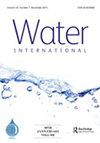金融普惠是否改善了家庭饮用水源?多哥案件的申请
IF 1.5
4区 环境科学与生态学
Q3 ENGINEERING, CIVIL
引用次数: 0
摘要
摘要本研究以多哥为例,探讨了普惠金融对发展中国家水基础设施融资缺口的影响。通过使用一些可靠的估计技术,我们发现,金融包容性与改善饮用水的可及性增加和到水源的旅行时间缩短有关,特别是在农村贫困地区、女性户主家庭和该国北部地区。正式普惠金融的影响高于非正式普惠金融,而非正式普惠金融的影响不显著。讨论了政策影响。本文章由计算机程序翻译,如有差异,请以英文原文为准。
Does financial inclusion improve household drinking water source? An application to the case of Togo
ABSTRACT This study investigates the impact of financial inclusion in bringing the financing gap of water infrastructure in developing countries using Togo as case study. Using a number of robust estimation techniques, we found that financial inclusion is associated with an increase in access to improved drinking water and a decline in the travel time to the water source, especially among the rural poor areas, female heads households and the northern part of the country. The influence of formal inclusive finance is higher and significant in contrast to informal financial inclusiveness, which has no significant impact. Policy implications are discussed.
求助全文
通过发布文献求助,成功后即可免费获取论文全文。
去求助
来源期刊

Water International
工程技术-工程:土木
CiteScore
4.40
自引率
7.70%
发文量
58
审稿时长
6-12 weeks
期刊介绍:
Water International is the official journal of the International Water Resources Association (IWRA), founded in 1972 to serve as an international gateway to the people, ideas and networks that are critical to the sustainable management of water resources around the world. Water International''s articles, state-of-the-art reviews, technical notes and other matter are policy-relevant and aimed at communicating in-depth knowledge to a multidisciplinary and international community. Water International publishes both individual contributions and thematic special issues and sections on cutting edge issues.
All individual manuscript submissions are subject to initial appraisal and peer review by the Deputy Editor in Chief and the Associate Editors, and, if found suitable for further consideration, to peer review by at least one independent, anonymous expert referee. All external peer review is double blind. Thematic issues and sections are handled under comparable procedures by guest editors under the oversight of the Editor in Chief.
 求助内容:
求助内容: 应助结果提醒方式:
应助结果提醒方式:


